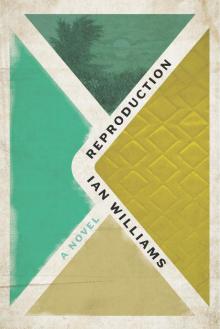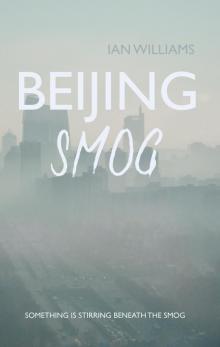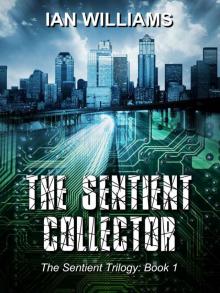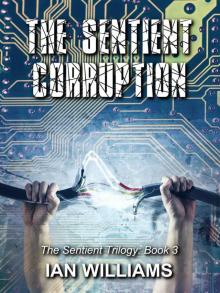- Home
- Ian Williams
Beijing Smog Page 9
Beijing Smog Read online
Page 9
Morgan said the Chinese rather liked British pomp and royalty.
The American ignored that and removed a brown envelope from an inside pocket. He gave two sheets of paper to Morgan, one giving brief details of a chemical company based in a city called Nanjing, the other a Shanghai-based insurance company, both of which he’d grabbed at random from a database at the consulate’s commercial section the day before. He said both were looking to snap up some US companies.
“We just want to know if they’ll make good partners,” Drayton said, and Morgan said that should be pretty straightforward. He said it wasn’t always clear where a lot of Chinese companies got their money and who ultimately owned them, but that he’d get the answers.
“That’s why we’ve come to you, Tony,” said Drayton.
In reality the American didn’t have a clue what the cement and insurance companies were up to, and cared even less, but he figured that requesting the extra research would boost his credibility with Morgan, help his cover.
“You’re the best,” he said, pouring on the flattery before he got to the real reason for the meeting.
“And there’s one more thing,” he said.
“Sure. What’s the deal?”
“Can’t really be sure at this point. Technology, broadly.”
Drayton took several photographs out of the envelope and laid them one by one in front of Morgan. The first was of a spiky-haired youngster in dark glasses. He appeared to be in some kind of bath with two girls. All were fully clothed.
“He’s into technology?” said Morgan.
“Yeah, but he likes a dip in a Jacuzzi from time to time. You know these tech types,” Drayton said, laying down two more photographs of the boy in a bigger group, champagne glasses in hands, smiling.
“It was his birthday,” Drayton said.
Then three more pictures. The kid getting into a car. The car driving off. A tight shot of the licence plate.
“Nice car,” Morgan said.
“Ferrari. Kid’s name is Chen Huizhi. And this, I believe, is his father.”
Drayton placed three more photographs in front of Morgan. The older man at the party, looking serious, uncomfortable in the crowd. Then with the kid, his hand on his shoulder, looking a bit more father-like.
“And his father, what’s his story?”
“That’s what I’m hoping you can tell me, Tony. There’s money there, but we’re not sure where it’s come from.”
“And you have somebody wanting to do business with these guys.”
“Yes, you could say that.”
“That’s not much to go on. What do you need?”
“As much as you can get.”
Drayton put the photographs back in the envelope, which he handed to Morgan, who went to put it in his bag.
“And there’ll be a decent bonus with this one, Tony. This one’s a bit more sensitive than the others.”
“Dawn on the Bund sensitive?” Morgan said. “I’ll see what I can do.”
“That looks a barrel of laughs,” Drayton said, pointing to a booklet with the title Golden Road, Golden Age, which Morgan had taken out of his bag and briefly placed on the table.
Morgan said it was the title of a conference he’d be attending later at the Shanghai Stock Exchange, about China building regional economic links. He said he was to be a keynote speaker.
“Bit of a casino that stock exchange if you ask me,” Drayton said. “What are you speaking about?”
“Addressing foreign investors mainly, telling them to keep their nerve, that emerging markets can be volatile. To have faith in the long-term future of the economy here.”
“And you plan to say all that with a straight face?”
Drayton picked up the booklet, quickly thumbing through it, and said, “Golden age of bullshit if you ask me.”
– 9 –
Fatso
Fatso rolled up his soiled vest so it perched just above his bare belly and pulled out another cigarette from a crushed packet in his back pocket.
“Warm enough for you?” Wang asked him.
Fatso ignored the question and lit the cigarette from one of the bright red bars of an old electric heater, which Wang thought you could probably use to smelt steel.
“You know smoking killed a million people in China last year,” Wang said. He told Fatso he’d read it online, posted by some doctors, so it might even be true.
“So, did they count them all? How do you know it wasn’t the air that killed them?” Fatso said, pointing to the window, which was steamed up because of the heat in the second-floor room.
“With cigarettes I have a choice. With the air I don’t.”
“And they’ve banned cigarettes from the coffee shop again,” said Wang.
Fatso laughed, like that was the stupidest thing he’d heard all morning.
“Oh yeah? Wear this,” he said throwing at Wang a mask from an open box, which was one of about a dozen piled against the wall, and all full of unsold PM2.5 Mega Blockers.
“You ordered them. They’re your masks,” he said, throwing some more. “You hear that?”
“She comes back, I’ve seen it before,” Wang said, thinking he was talking about the old television in the corner, which was showing a rerun of some family drama, a woman throwing pots and pans at her in-laws, screaming, then storming out of the house.
“No, not that. That,” said Fatso, walking to the window and opening it, giving them a grandstand view of another drama unfolding at the railway crossing, just beyond the bicycle-clogged alleyway below. The barrier was down again and an angry crowd looked like they’d given up on waiting for the train.
Cars were honking horns and bikes were edging closer to the barrier. But as far as Wang and Fatso could see the real threat came from a group of women who’d already climbed over the barrier and were moving closer to the track, egging each other on.
Two policemen in thick, badly fitting coats blew whistles and yelled at them. But the women just got bolder and yelled back. Fatso said it was the most entertaining thing he’d watched all week. One woman was carrying a small child and was now right in the face of one of the cops, screaming, as they bombarded each other with spittle and steamy breath.
“He’s going to hit her. I swear he’s going to hit her,” said Fatso, getting excited, as the policeman took one step back, like he was getting ready to lunge at the woman.
But quickly several other women flanked her. To Fatso they looked like a row of gunslingers from one of the B-grade American westerns he liked to watch when he wasn’t catching a rerun of a mindless soap.
And, like gunslingers, their hands were poised over their pockets, ready to draw.
Only, their weapons were their smartphones.
The policeman appeared to blink, retreating a few steps. Then something was said by one of the women, which Wang and Fatso didn’t quite catch, but the cop did and he just snapped, yelling and then lurching at the woman with the child, pushing her back. She fell to the ground, as did the child, screaming.
The gunslingers were quick to the draw, and half a dozen smartphones were already rolling.
The child grabbed the policeman’s hand and sank in its teeth. The cop screamed and kicked the child. By now there were phones raised right along the barrier. It could have got a lot worse, only the train came, a piercing blast of a whistle announcing its approach. Now both sides had to retreat.
No sooner had the train passed, and more than twenty videos were being uploaded to the web and would soon be shared by millions.
“Bastards,” said Fatso. “They should have thrown the cops under the train. They think they can treat you like shit.”
“They can treat you like shit,” said Wang.
Fatso pulled his smartphone from his pocket and waved it in Wang’s f
ace.
“There’s something changing in this country,” he said. “It’s getting harder for them to trick us. Much harder.”
Wang just shrugged. “So do we have a deal?” he asked, coming back to the masks. And Fatso said sure, let’s do that, deferring the money for the masks for a share in profits on sales of the Star Wars caps.
“You think they’ll sell?” he asked.
“Of course,” said Wang, telling him Star Wars was huge in China.
Fatso cleared his throat and spat into a waste paper basket beside the boxes of masks. He’d get them made, he said.
Wang told him he’d read that 70% of stuff sold online was fake. Fatso said he doubted that.
“That means 30% is genuine. That can’t be possible.”
Fatso said he wanted to buy some shares.
“I think there may be money to be made on the Shanghai stock market.”
“But it’s just collapsed.”
“That’s my point, Wang. I can’t see the Government letting it go lower, or they’ll have more of that,” he said, pointing towards the railway crossing.
Wang told him his friend Liu Wei had a share trading account, but that Liu’s dad was some big-shot government official, doing lots of economic stuff, so Liu pretty much knew what was going to happen before it happened.
“That’s ideal,” Fatso said. “Why else would you buy shares?
“And another thing,” he said. “I want to set up one of those websites to give investment tips.”
“But you don’t know anything about investing.”
“That’s beside the point. I can learn.”
Fatso told Wang he was thinking of getting a diploma in advanced stock market strategy from the Mid-America University of Advanced Finance.
Wang said he’d never heard of it.
“You don’t seem the studious type,” he said. “How long’s that going to take you? One, two years? Is it online, or do they have a campus here?”
“It takes about ten minutes, just fill in some stuff online and send 500 yuan. They send you the diploma. Saves all that studying. For an extra fifty, they’ll arrange a graduation photo with one of those flat boards on your head and a reference from the Dean.”
Wang agreed that it saved time.
They shook hands on their deal, and Wang gave Fatso the spec for the caps. Then he headed back down the stairs and through another room where a woman, much younger than Fatso, sat at a printing machine that hissed and spluttered and gave off more heat than the electric bar heater upstairs.
Wang assumed this was Fatso’s wife or mistress or something, since she was always around. He’d never been introduced though, and Fatso wasn’t about to do the formalities this time either.
She was turning out replica football shirts with a logo for Liverpool Football Club, which Wang had read would soon be playing some exhibition games in China.
“Nice,” he said, picking up a shirt. Fatso ignored him. So did the woman.
“Your friend, this Liu, he’s doing okay with his stock market stuff?”
“Up and down. How’s business for you? Looks like you have a lot going on.”
“A man should fear fame like a pig fears getting fat,” said Fatso, a saying he seemed so proud of he repeated it.
It was an old saying, which Wang had heard from his father, usually as a warning that nobody should think himself bigger than the Communist Party.
Though from Fatso it was more of a ‘butt out and mind your own business’. He had his own very small circle of trust, if he had one at all, and Wang wasn’t in it. That’s how he survived.
Fatso went back upstairs and left Wang to find his own way out.
Back on the street, the traffic was flowing again, and the policemen were snarling at a vendor, accusing her of setting up a stall selling earphones for smartphones too close to the railway barrier. As Wang passed, the vendor yelled something at the cops, but then thinking better of it, moved back a few feet.
Wang looked back down the alleyway towards Fatso’s place. On the face of it, his stock market idea seemed a little ridiculous, but Fatso was smart – not academic smart, but street-smart.
He’d got money, of that Wang was certain, compensation for the old house he’d been forced out of by one of the many new developments that had changed the face of the city, ripping the heart out of old Beijing. Fatso’s had been a traditional house, a hutong home, and he’d appealed to various international heritage organisations to keep the developers at bay. Foreign television teams had visited his area, and he’d told them he’d resist until the end.
And resist he did. At least until he was happy with the compensation.
He’d never seen the romance of outside toilets and Qing Dynasty plumbing, and the money he’d squeezed from the developer bought him his three-storey shophouse with plenty of change to spare. Or so Wang suspected.
He reckoned his own landlord was playing a similar game. He’d sounded the guy out and just got bland answers that all was well, that he’d never sell up, which just convinced Wang that his shabby low-rise was probably doomed. The buildings all around were slated for demolition. Some had already been pulled down.
It felt sometimes like his home and university were in the middle of a construction site. Two of the city’s subway lines had been extended to the area, and with them had come a building frenzy. Malls and high-rises were sprouting all around. Old neighbourhoods were being flattened.
The University had benefited too, with some new faculty and research buildings, though it felt to Wang like a bad consolation prize for all the disruption.
Not that the dreary apartment he and his friends rented had much appeal. There was nothing Qing Dynasty about its leaking roof and creaking plumbing. It was the convenience that mattered to him, cheap and so close to University.
A long road leading to his University, and to his apartment, was lined with a high wall to hide the construction. It was covered with murals. Satellites, space rockets, a ballistic missile, computers, an aircraft carrier. A slogan written in large characters said they were building a civilised society. The Chinese Dream.
Wang knew there’d been a few holdouts, fighting the developers, but it seemed a lost cause.
He took his phone from his pocket, put in his earphones and zoned out. He was on autopilot, along a route home that he knew so well he could navigate just about every obstacle without ever looking up from his screen. He opened a game trying to line up rows of colourful blob-like animals on a grid, clicking and zapping until he had three in a row to win points.
Closer to his apartment block, part of the wall had been screened off and workmen were trying to paint over graffiti. The graffiti was of a stick alien, not the best drawing, but it was definitely a stick alien. Just like Wang’s stick alien. It had been spray-painted on the wall, over the top of the slogan about the Chinese Dream, and the workmen were now obliterating it.
Not that Wang saw the graffiti. And he would barely have noticed the workmen at all had he not almost fallen over a tin of their paint, looking up briefly as one of them swore at him. His mind was on the blobs he was trying to line up on his phone.
Three policemen in heavy coats stood close by, supervising the paint job. They watched Wang as he passed. One of them told him to pay attention and look where he was going, saying it in a sneering sort of way. Wang grunted, a pissed off sort of grunt. Though it had nothing to do with the cop, whom he hadn’t even heard. It was because he’d just failed to match three yellow birds and was stuck at level thirty-one of his game.
He reached his apartment block just as two more policemen were leaving from its main entrance. One of them asked Wang if he lived there, and when he said yes they showed him two photographs – grainy black and white computer printouts. They looked to Wang like they’d been taken fro
m a surveillance camera up on the main road, and they showed what appeared to be an old man spraying something on the wall.
“You know this man?” said one of the policemen.
“Why, what’s he done?” said Wang.
“I’m the one asking the questions and I asked you if you know him.”
Then the second cop said the old man was a vandal who’d destroyed state property.
“Oh, yeah?” said Wang. “Never seen him before.”
Wang entered the dark stairwell of his apartment block and began to climb the stairs, stopping on the first-floor landing and looking out of a cracked window as the cops headed across a piece of cleared land towards another block. Going door to door.
The old man in the photographs was well known in the neighbourhood, a holdout, the last person still living in one of the condemned blocks nearby, which he was refusing to leave. He’d always seemed friendly and harmless enough to Wang, though not to the developers. Wang wasn’t about to give him away, though he suspected it wouldn’t be long before someone else did.
He continued up the stairs, back on his phone, and by the time he reached his door he’d matched three frogs, followed by three foxes. Then with a ding and a chirp, the game told him he’d now reached level thirty-two, and awarded him twenty happy coins.
– 10 –
Myopia
Wang Chu was woken by what sounded like the clanking and rumbling of heavy machinery. He sat bolt upright in the chair in which he’d dozed off and spent the night clinging to his laptop and smartphone. There was a loud crunch and a thud that made his room shake, followed by a long straining sound and the crash of falling glass and bricks.
He thought that maybe this was an earthquake and he ran out of his room, through his small kitchen and onto a landing where Zhang Jun and Liu Wei were already at the window looking out at a row of diggers and small cranes, lined up like in the photograph he’d posted of American tanks in the Iraqi desert.
The early morning smog had drained the scene of most of its colour, and the machines were just dark shadows, the diggers raising their long arms, demolition balls swinging from the cranes, as they prepared for a final assault on a small apartment block, already half flattened.

 Reproduction
Reproduction Beijing Smog
Beijing Smog Disorientation
Disorientation Pieces of Me
Pieces of Me The Sentient Mimic (The Sentient Trilogy Book 2)
The Sentient Mimic (The Sentient Trilogy Book 2) The Sentient Collector (The Sentient Trilogy Book 1)
The Sentient Collector (The Sentient Trilogy Book 1) The Sentient Corruption (The Sentient Trilogy Book 3)
The Sentient Corruption (The Sentient Trilogy Book 3)